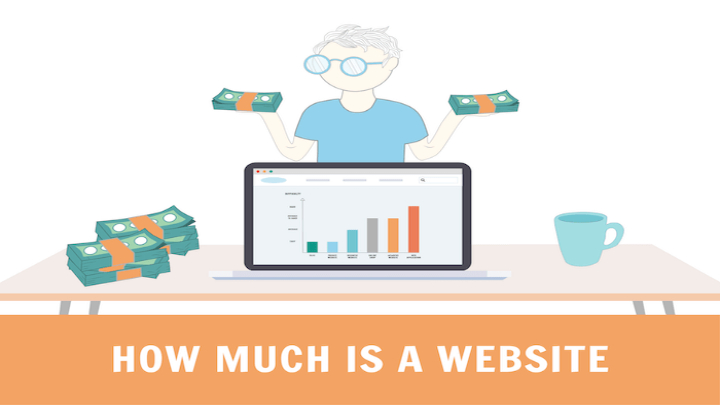It’s Thursday afternoon, September 22, 2022, right now, and I’m hopping back on the article bandwagon for DJ LIFE mag. I’ve been absent for a bit, apologies for that. After a great DJX’22 in Atlantic City, N.J. this past August, I returned home to Ottawa, Canada… and proceeded to get COVID four days later. I’m all good now though, and catching up.
So, this week’s topic is: What one should expect to pay for a website. This article was literally inspired just yesterday by a conversation I had with someone who’s expectations were way off. In short, he wanted to pay only a few hundred dollars for a 20-page WordPress site, as well as a logo… all in the same package. (Everyone say: “$250 DJ!”)
After my initial shock of the vast disconnect between what this person (no names or any other clues) wanted to pay for this comprehensive package, I realized that perhaps some DJs just have no clue about the cost of a real website. Accordingly, this article will hopefully solve that problem, and give DJs in North America some rational expectations as to what they can expect to pay.
First, let’s break it down in terms of the biggest choice you have to make when it comes to websites:
Are you trying to rank on Google, or not?
I don’t care about ranking on Google!
Recommended for those of you with less than 10-20 gigs a year:
If you’re not trying to rank on Google, then your task is easy. Don’t pay a cent, and create a free account on one of the Web Builders such as Wix, Squarespace, GoDaddy, Google Websites, etc. Most of you can learn how to work on these platforms, and publish something workable within a short period of time. Note, however, that these so-called “free builders” aren’t necessarily free. They do have some bait-n-switch features that you’re going to need eventually, and after a couple of years the costs will add up. Still, you’ll pay far less than getting a professional to code up a site for you.
Examples of Upsells, including but not limited to…
- Using your own custom domain
- Remove Wix Ads & Branding
- SSL Certificates
- Bandwidth
- Storage
- Video streaming
- Analytics
I do want to rank on Google!
Recommended for those of you with more than 20-plus gigs a year:
If your business could use a better Google ranking, then your website will cost far more money – but you will be able to be considered an investment into your overall marketing strategy. It can actually save you time as well, in some cases even justifying the cost of the website just from the time you save on previously manual tasks alone!
Here’s a general overview of what goes into a DJ-oriented 28-page site, along with the approximate hours each phase takes to complete:
- Setup (two hours)
- Create Host
- Install WordPress
- Install Theme
- Install Plugins
- Pages (28 hours)
- Home
- About
- FAQ
- Services (assume six main service types, plus the summary page)
- Add-Ons (assume 10 main add-on types, plus the summary page)
- Resources (assume three main resource types, plus the summary page)
- Form Intake
- Blog
- Contact
- Onsite SEO (30 hours)
- Google Site Kit Setup
- Core Web Vitals Analysis
- Yoast per-page Configuration
- Structured Data
- Per-page Plug-in Deactivation
- Image Optimization
- Cache Configuration
- Other Plugin Configuration (10 hours)
- Backups
- Video Popups
- Live Chat
- Various Pixels (Hotjar, Google, Facebook, etc.)
- SMTP
- Client Interaction (10 hours)
Total hours spent? Eighty hours for a really good, comprehensive site. And, we haven’t even started discussing monthly hosting and maintenance yet.
Taking a look at those 80 hours on various pay scales, here’s a few examples of hourly breakdown of costs:
- Done by a STUDENT (i.e., junior dev) – $20 per hour = $1,600
- Done by an INTERMEDIATE developer – $50 per hour = $4,000
- Done by a SENIOR developer – $100 per hour = $8,000
Note that student devs probably won’t be able to execute on the Onsite SEO section, so that will drive the overall student price even lower. Also note, these are rough guidelines. You might be lucky enough to know someone in the business who can give you a “friends-&-family” discount, which you should definitely accept if your contact can execute on the above.
One way to save on the upfront is to backload your Onsite SEO portion, which is approximately 30 hours. If you’re lucky, your developer is also an SEO person (often the case with Senior Developers), which allows you to push back on the need to do the Onsite SEO right away, and rather execute on that as part of an ongoing monthly SEO service (which any serious DJ company absolutely needs). That will align your costs with your monthly revenue a little more conveniently.
Last way to ease your cash flow burden and still obtain your premium website? Ask for a financing program. Web developers are in a unique position to offer part or all of a website project as financed, even without a credit check! In the case of website financing, you should expect that the web developer in question will insist on denying you access to the source code, though, as that is the only way to enforce compliance on the terms. Still, even without access to the source code, you can still enjoy a premium website for your brand.
A great website can make all the difference for your brand/business. It engenders much higher trust amongst potential customers, works to generate leads for sales, and can often pay for itself through automating tasks such as having form submissions being emailed directly to you. In a world where online is where all your customers are, the website is still the hub of it all.
P.S. – Finally, let’s not forget our inspiration for this entire article – the DJ who offered $300 for the site broken down above.
- $300 / 80 = $3.75 per hour
Can we say “$250 Wedding DJ” everyone?
Jordan St. Jacques is the President/Lead Digital Marketer at Digitera.Interactive in Ottawa, Ont., Canada.
To check out more business tips, click here.


